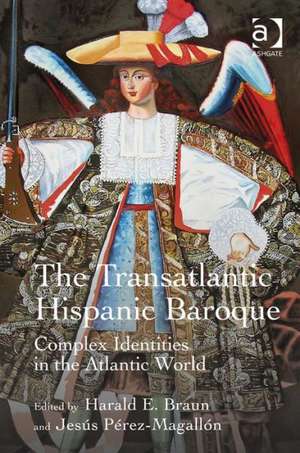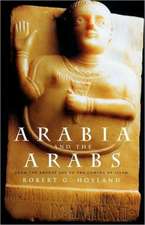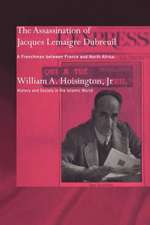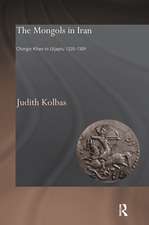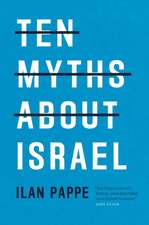The Transatlantic Hispanic Baroque: Complex Identities in the Atlantic World
Autor Harald E. Braun, Jesús Pérez-Magallónen Limba Engleză Hardback – 28 noi 2014
| Toate formatele și edițiile | Preț | Express |
|---|---|---|
| Paperback (1) | 263.15 lei 6-8 săpt. | |
| Taylor & Francis – 14 oct 2024 | 263.15 lei 6-8 săpt. | |
| Hardback (1) | 1010.53 lei 6-8 săpt. | |
| Taylor & Francis – 28 noi 2014 | 1010.53 lei 6-8 săpt. |
Preț: 1010.53 lei
Preț vechi: 1232.35 lei
-18% Nou
Puncte Express: 1516
Preț estimativ în valută:
193.39€ • 201.16$ • 159.65£
193.39€ • 201.16$ • 159.65£
Carte tipărită la comandă
Livrare economică 12-26 aprilie
Preluare comenzi: 021 569.72.76
Specificații
ISBN-13: 9781472427502
ISBN-10: 1472427505
Pagini: 330
Dimensiuni: 156 x 234 x 21 mm
Greutate: 0.75 kg
Ediția:Revised.
Editura: Taylor & Francis
Colecția Routledge
Locul publicării:Oxford, United Kingdom
ISBN-10: 1472427505
Pagini: 330
Dimensiuni: 156 x 234 x 21 mm
Greutate: 0.75 kg
Ediția:Revised.
Editura: Taylor & Francis
Colecția Routledge
Locul publicării:Oxford, United Kingdom
Cuprins
Introduction, Harald E. Braun and Jesús Pérez-Magallón. Part I The Constitution of Identities in the Hispanic Baroque: Person and individual: Baroque identities in theology and law, Bartolomé Clavero; Towards a constructionist essentialism: critical race studies and the Baroque, Ruth Hill; Higher education, ‘soft power,’ and Catholic identity: a case study from early modern Salamanca, Harald E. Braun; ‘The people of the King’: autonomy and collective identity in Coyaima, Renée Soulodre-La France. Part II Hispanic Baroque: Religion, Politics, Society: Baroque religion in Spain: Spanish or European?, Henry Kamen; The Baroque and the influence of the Spanish monarchy in Europe (1580-1648), José Javier Ruiz Ibáñez; Rethinking identity: crisis of rule and reconstruction of identity in the monarchy of Spain, Pablo Fernández Albaladejo; The preacher feeds and the sermon soothes: body and metaphor in Jesuit preaching, Carlos-Urani Montiel and Shiddarta Vásquez Córdoba. Part III The Urban World and the Hispanic Baroque: The Creole metropolis, Manuel Lucena Giraldo; Foreign communities in the cities of the Catholic monarchy: a comparative perspective between the overseas dominions and the Crown of Castile, Manuel Herrero Sánchez; Writing Madrid, writing identity: a spatial dialogue between the 17th and 18th centuries, Jesús Pérez-Magallón; The city and the phoenix: earthquakes, royal obsequies, and urban rivalries in mid-18th-century Peru, José R. Jouve Martín; The imagery of Jerusalem in the colonial city, Patricia Saldarriaga. Part IV Neo-Baroque Approaches to Identity: Elegies for a homeland: a Baroque chronicle, a Marxist critique, and conflicting identities in colonial Guatemala, W. George Lovell; Neo-Baroque Catholic evangelism in post-secular Mexico, Kristin Norget; La Fiesta de Santo Tomás as a technology of culture: memory, carnival, and syncretism in the modern Guatemalan identity, Anabel Quan-Haase and Kim Martin. Index.
Notă biografică
Harald E. Braun is Senior Lecturer in European History (1300-1700) at the University of Liverpool. He is the author of Juan de Mariana and Early Modern Spanish Political Thought (2007). He co-edited Contexts of Conscience in Early Modern Europe (2004), The Renaissance Conscience (2011), and Theorising the Ibero-American Atlantic (2013), and has published articles and chapters on early modern intellectual history, especially the history of early modern Spanish political thought, culture, and communication. Jesús Pérez-Magallón is Professor of Hispanic Studies at McGill University. His principal areas of research are the origins of modernity, particularly the transition from the Baroque to the Enlightenment, and nineteenth-century intellectual history. Other research areas are the Hispanic Baroque, Golden Age Drama, and Textuality and Nationalism. He has published extensively, including Construyendo la modernidad. La cultura española en el tiempo de los novatores (1675-1725) (2002), and Calderón. Icono cultural e identitario del conservadurismo polÃtico (2010). He was awarded the Encomienda de la Orden del Mérito Civil by the Spanish government (2009), and is a recipient of the McGill University-Faculty of Arts Award for High Distinction in Research (2000).
Descriere
Gathering a group of internationally renowned scholars, this volume presents cutting-edge research on the complex processes of identity formation in the transatlantic world of the Hispanic Baroque. Identities in the Hispanic world are deeply intertwined with sociological concepts such as class and estate, with geography and religion, and with issues related to the ethnic diversity of the world’s first transatlantic empire and its various miscegenations. Contributors offer the reader diverse vantage points on the challenging problem of how identities in the Hispanic world may be analyzed and interpreted.
